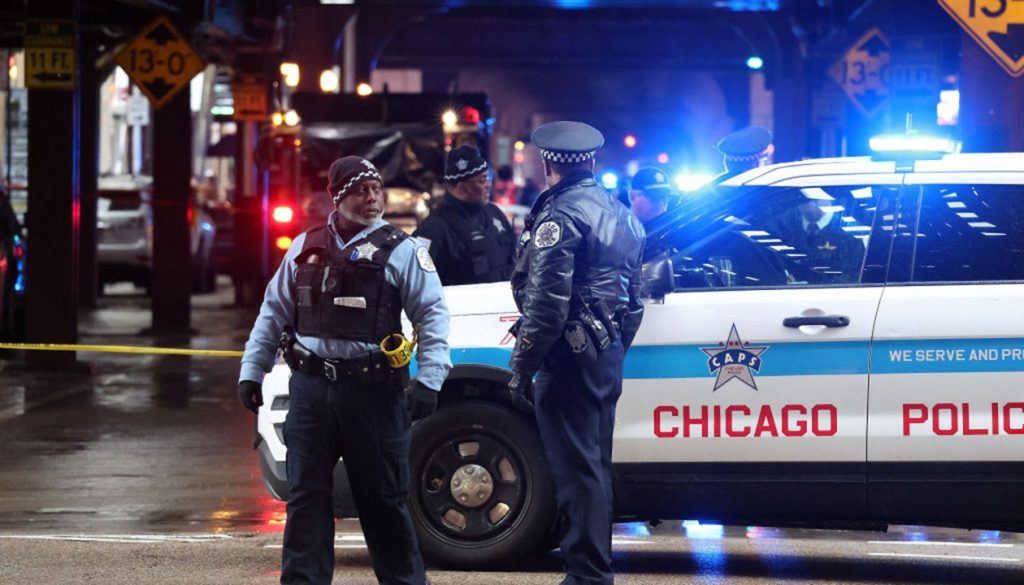Labor Day Weekend Violence in Chicago Sparks Political Tensions
The Labor Day weekend in Chicago turned tragically violent, with five people killed and 35 others wounded in shootings across the city. This surge in violence has intensified an already heated political dispute between former President Donald Trump and Illinois’ Democratic leadership. On Friday night, two women were shot in a South Shore apartment, with one 25-year-old victim succumbing to her wounds at the University of Chicago Medical Center after being hit in both the abdomen and leg. The following day brought more bloodshed when an SUV pulled up alongside two men, and a gunman opened fire, killing a 29-year-old who later died at Mount Sinai Hospital. That same evening, in a particularly disturbing incident, five suspects approached and fatally shot a 43-year-old woman. The violence continued unabated into Sunday, claiming two more lives—a 33-year-old man shot in the head and a 46-year-old man killed in a triple shooting just an hour earlier.
The weekend’s violence has become the latest flashpoint in a growing confrontation between former President Trump and Chicago’s Democratic leadership. Days before the shootings, Trump had warned he would send the National Guard to Chicago to address the city’s persistent crime problems. Following the violent weekend, Trump escalated his rhetoric, posting on Truth Social that Illinois Governor JB Pritzker was “incompetent” and issuing an ultimatum: “straighten it out, fast, or we’re coming.” This approach mirrors Trump’s recent executive action in Washington, D.C., where he federalized the Metropolitan Police and mobilized the National Guard, signaling a potential pattern in his approach to urban crime in Democratic-led cities.
Chicago’s leadership has responded with firm opposition to any federal intervention. Governor Pritzker characterized Trump’s threat as “unconstitutional” and “a dangerous power grab,” reflecting concerns about federal overreach and the implications for local governance. Chicago Mayor Brandon Johnson took concrete action by signing an executive order Friday specifically opposing any deployment of federal troops or the National Guard to the city. “We do not need nor want an unconstitutional and illegal military occupation of our city,” Johnson declared, emphasizing the city’s commitment to “do everything in our power to defend our democracy and protect our communities.” This standoff highlights the deep political divisions over how best to address urban violence and the proper role of federal authority in local law enforcement matters.
The situation in Chicago exemplifies the human cost of both persistent urban violence and political deadlock. Behind the statistics are real lives lost and communities traumatized by continuing bloodshed. The five victims from this weekend alone represent families shattered and futures erased. The 25-year-old woman shot in her apartment, the 29-year-old man gunned down on the street, the 43-year-old woman approached by multiple attackers, and the men killed on Sunday morning—each was someone’s child, possibly someone’s parent, friend, or partner. Beyond those killed, the 35 wounded survivors now face physical recovery and psychological trauma that may last a lifetime. These human stories often become obscured in the political battle over solutions.
The controversy surrounding potential National Guard deployment touches on fundamental questions about effective approaches to urban violence. Advocates for federal intervention point to Chicago’s longstanding struggles with gun violence and argue that local leadership has failed to adequately protect citizens, particularly in the most vulnerable neighborhoods. They suggest that a show of force through National Guard presence could disrupt patterns of violence and restore order. Critics, however, warn that militarizing the response to urban crime could inflame tensions, violate civil liberties, and fail to address the root causes of violence—including poverty, inequality, lack of opportunity, and easy access to firearms. They advocate instead for community-based solutions, economic investment, and targeted prevention programs that have shown promise in other cities facing similar challenges.
This standoff between Chicago’s leadership and the former president reflects broader national tensions about federalism, public safety, and political responsibility. The Constitution establishes a delicate balance between federal authority and local control, with public safety traditionally falling primarily within the jurisdiction of states and municipalities. Trump’s threats to override local authority represent a significant challenge to this balance, raising questions about precedent and the potential for selective federal intervention based on political considerations rather than objective criteria. Meanwhile, Chicago residents caught in the crossfire of both bullets and political disputes simply want effective solutions that make their neighborhoods safer. As the debate continues, the true measure of success will be whether Chicago can reduce the human toll of violence while preserving democratic governance and constitutional principles—a challenge that extends far beyond a single holiday weekend or political confrontation.


